If you spend hours each week copying data from different marketing platforms into Excel spreadsheets, manually creating client reports, and constantly switching between analytics dashboards, you experience the exact pain point that DashThis was designed to solve. But here’s the question many marketers and agencies are asking: Is DashThis still the best solution in 2025?
The short answer depends on your specific needs. While DashThis remains a solid choice for basic reporting automation, the competitive field has shifted dramatically. New features, pricing models, and specialized tools have emerged that might better serve your business requirements.
This comprehensive guide explores the top DashThis alternatives available in 2025, helping you understand which solution aligns best with your goals, budget, and growth plans.
What DashThis Offers and Where Competitors Beat It
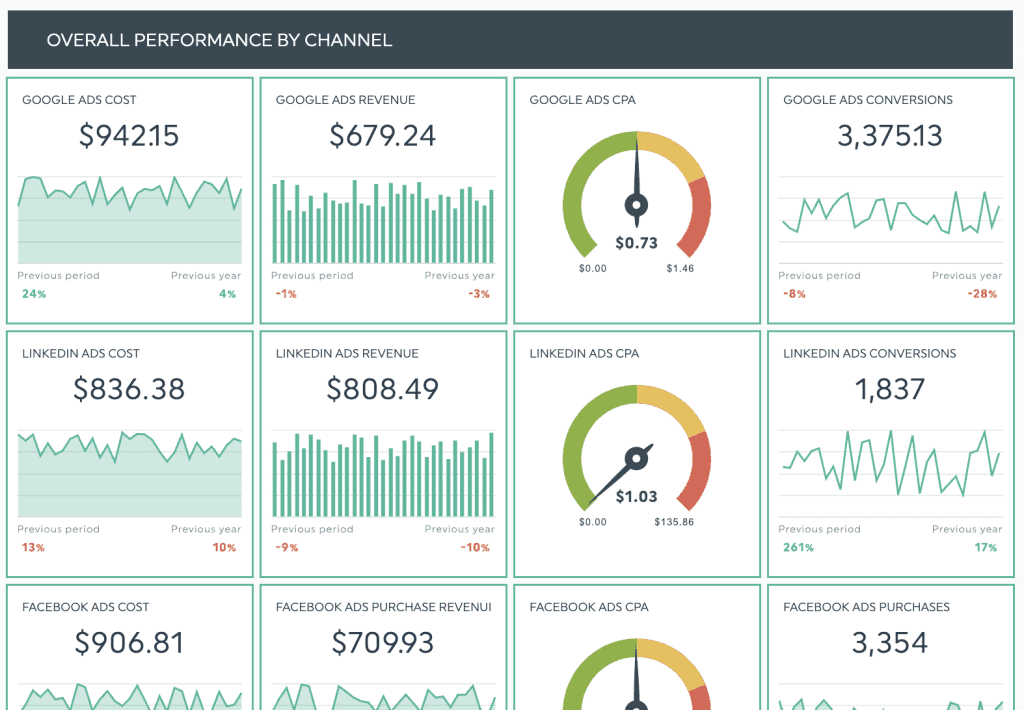
To make an informed decision about alternatives, you first need to understand what DashThis brings to the table and where it’s being outpaced by competitors. The reporting tool market has matured significantly, with new players offering features that weren’t even possible when DashThis first launched.
DashThis currently provides 30 integrations, AI Insights in beta, unlimited data sources per dashboard, with their Standard plan at $409 monthly. Their newly launched AI Insights feature analyzes marketing performance and highlights wins, issues, and opportunities instantly.
DashThis Strengths:
- Simple drag-and-drop interface that requires no technical skills
- Exceptional customer support with dedicated specialists
- White-label capabilities for agency branding
- Automated report scheduling and PDF exports
- New AI Insights feature for automated analysis
Where DashThis Falls Short:
- Limited integrations compared to competitors – DashThis offers 30+ native integrations, which doesn’t include important channels like Salesforce, Shopify, and Google DV360
- Dashboard-based pricing becomes expensive – The pricing structure forces you to pay for unused capacity. With tiers at 3, 10, 25, and 50 dashboards, agencies with 4 clients must pay for 10 dashboards, while those with 26 clients pay for 50 dashboards. Users report that “a subscription became a little pricey for me; I found I wasn’t using the tool enough to warrant the cost” because they’re paying for dashboards they don’t need
- Limited customization options – G2 users consistently cite “lack of customization options” as the primary driver for switching
Why Business Intelligence Market Growth Changes Everything
The reporting dashboard space isn’t just shifting incrementally—it’s going through fundamental changes that make choosing the right platform more critical than ever. Understanding these market forces helps explain why so many businesses are reevaluating their reporting tools.
The business intelligence market is experiencing unprecedented growth. According to Mordor Intelligence research, the Business Intelligence market stands at USD 38.15 billion in 2025 and will reach USD 56.28 billion by 2030 with an 8.17% CAGR.
The market has shifted significantly. According to Mordor Intelligence data, subscription and SaaS contracts formed 60% of turnover in 2024, and managed BI-as-a-service will grow 14.21% annually to 2030 as firms seek predictable OPEX.
What makes this particularly relevant for DashThis users is that Microsoft Power BI maintains market leadership with over 30% market share despite price increases, showing that organizations prioritize advanced features over cost savings. This trend pressures simpler tools like DashThis to adapt or risk losing market share.
How AI Features Are Separating Winners from Losers
Perhaps the most significant change is the integration of artificial intelligence into reporting platforms. While DashThis has introduced AI Insights in beta, this represents a reactive rather than proactive approach to AI adoption. The market leaders have been building AI-native features for years, creating a substantial competitive gap.
Why Per-Dashboard Pricing Models Are Failing Businesses
Traditional per-dashboard pricing models like DashThis uses are increasingly seen as inflexible. Modern alternatives offer everything from data source-based pricing to unlimited usage models, giving businesses more predictable costs and scaling flexibility.
Best DashThis Alternatives Ranked by Business Type and Budget
The alternative field spans from simple dashboard builders to enterprise-grade analytics platforms. Each category serves different needs, and understanding these distinctions helps narrow your options quickly.
Databox Wins With 130+ Integrations and Unlimited Dashboards
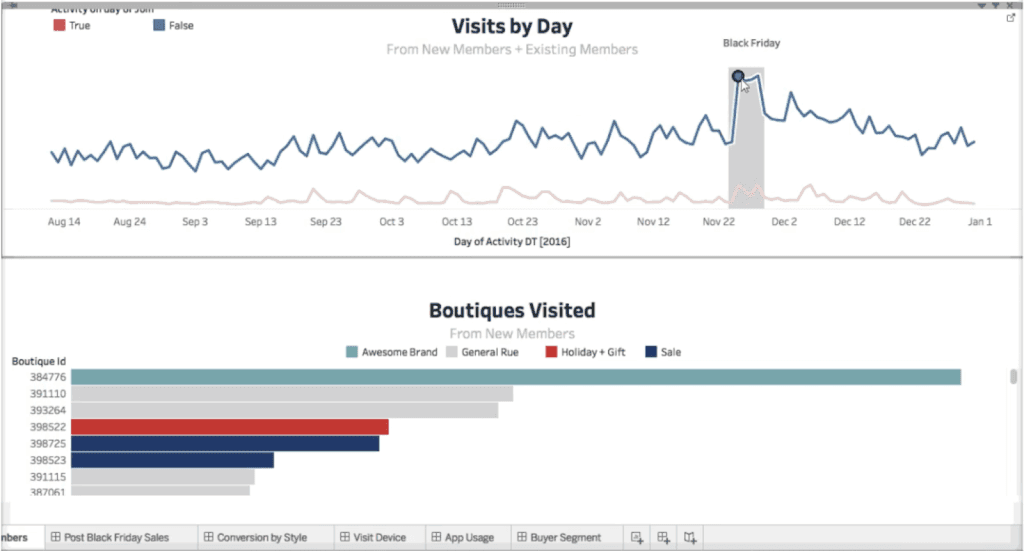
Why It Leads – Databox offers 130+ integrations (4x more than DashThis) with unlimited dashboards, making it the most comprehensive alternative for growing businesses.
Key Advantages:
- Unlimited dashboards across all plans
- Mobile-first design with excellent iOS/Android apps
- Custom metrics and calculated fields
- Strong data visualization capabilities
- Advanced goal tracking and benchmarking
Pricing – Plans range from $199-999 monthly, which may seem higher than DashThis initially, but the unlimited dashboard model often provides better value at scale.
Perfect For – Medium to large agencies that need extensive integrations and want predictable costs without dashboard limitations.
Swydo Costs Less for PPC and Social Media Specialists
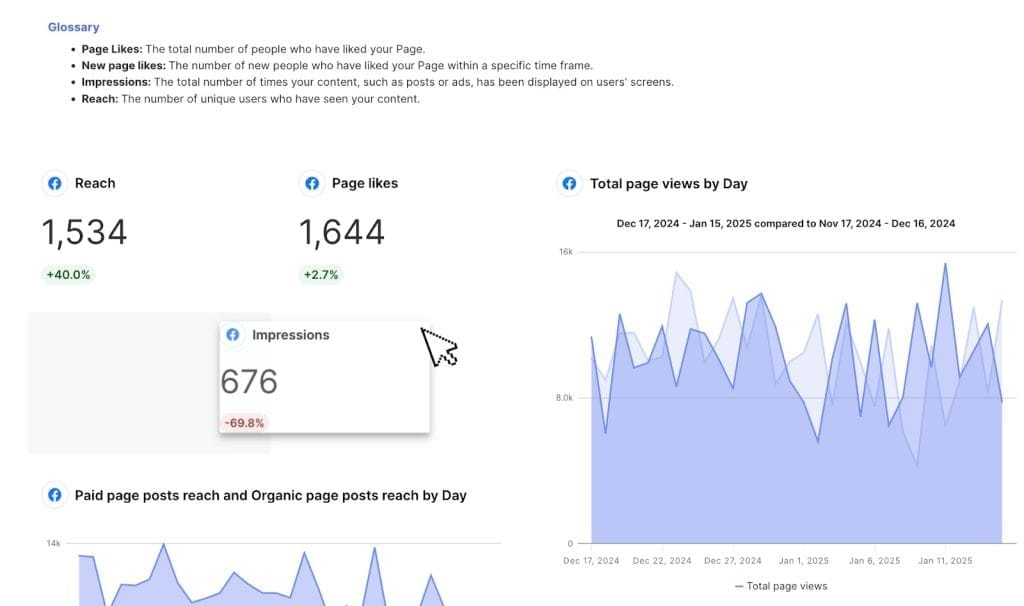
For agencies that focus on specific services rather than full-service marketing, Swydo offers a unique value proposition that can be significantly more cost-effective than broader platforms.
Swydo offers unique value with its data source-based pricing at $69/month for 10 data sources, plus $4.00 for each additional source.
Unique Strengths:
- Ability to merge metrics from 5 platforms in single widgets
- Centralized client monitoring overview
- Most cost-effective choice for PPC specialists and social media agencies
- 34+ integrations with major platforms
Perfect For – Specialized agencies with 2-4 data sources per client, particularly PPC and social media focused agencies. Swydo’s pricing model is the most cost-effective since you only pay for the data sources you actually use. When you onboard a new client, you simply add their data sources rather than paying for unused dashboard slots or client seats.
Read our article on Dashthis vs Swydo for more granular comparison
Whatagraph Leads with AI Chatbots and Natural Language Queries

The Value Proposition – Whatagraph provides 55+ integrations without dashboard limits, plus innovative AI features that DashThis’s beta version doesn’t yet match.
Standout Features:
- Cross-channel performance insights
- Advanced data transformation capabilities
- Unlimited reports and dashboards across all plans
- Strong visualization options with drag-and-drop interface
Ideal For – Businesses that need multiple dashboards without worrying about per-dashboard costs, especially those wanting advanced AI features.
AgencyAnalytics Combines Reporting with Built-In SEO Tools
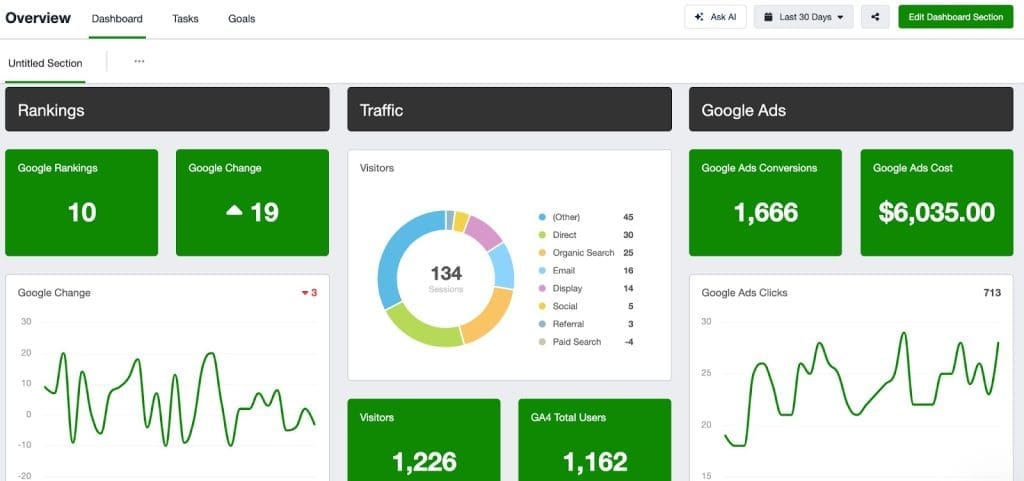
Agency workflows often require more than just reporting—they need tools that integrate directly with the services they provide. AgencyAnalytics recognizes this by combining reporting with built-in SEO tools, addressing a gap that DashThis leaves open for agencies managing search optimization campaigns.
Agency-Specific Benefits:
- Built-in rank tracking and SEO monitoring
- Client management features designed specifically for agencies
- Automated white-label reporting
- Transparent per-client pricing model
Pricing – Starting at $59/month for the Freelancer plan, but most agencies need the $349/month Agency plan for full functionality with 15 clients
Consider If – Your agency provides SEO services alongside other digital marketing activities and wants an all-in-one solution.
Microsoft Power BI Dominates with 30% Market Share Despite Higher Costs
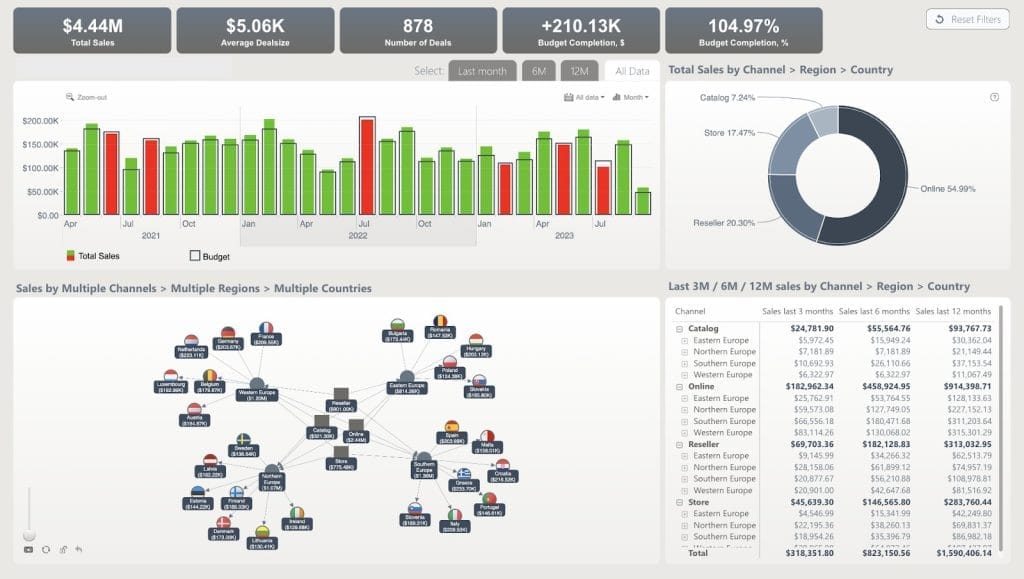
When businesses outgrow marketing-focused reporting tools, they often migrate to enterprise business intelligence platforms. Microsoft Power BI represents this category’s gold standard.
For large organizations requiring enterprise-grade capabilities, Microsoft Power BI remains the market leader.
Enterprise Benefits:
- Deep Microsoft ecosystem integration
- Advanced analytics and machine learning capabilities
- Robust security and compliance features
- Scalable architecture for massive datasets
Industry-Specific Platforms That Beat Generic Marketing Dashboards
While general-purpose reporting tools work for basic needs, specialized industries often require features and compliance capabilities that generic platforms cannot provide. Understanding these specialized alternatives can be crucial for certain business types.
E-commerce Businesses Need Attribution and Profit Tracking
Generic reporting tools like DashThis often miss crucial e-commerce metrics that directly impact profitability. Specialized platforms provide features specifically designed for online retail:
- Real-time profit and loss tracking
- Attribution modeling across channels
- Customer lifetime value analysis
- Inventory performance insights
Popular e-commerce alternatives include Triple Whale, Northbeam, and Glew, which offer mobile-optimized dashboards and advanced attribution modeling specifically for online retailers.
SaaS Companies Must Track MRR, Churn, and Customer Lifetime Value
SaaS businesses operate on fundamentally different metrics than traditional companies, requiring specialized tracking that general marketing dashboards can’t provide effectively:
- Monthly/Annual Recurring Revenue (MRR/ARR) tracking
- Churn analysis and cohort studies
- Customer acquisition cost (CAC) optimization
- Net promoter score (NPS) integration
Tools like Baremetrics, GrowthOptix, ChartMogul, and ProfitWell specialize in these SaaS-specific metrics and integrations.
Healthcare Organizations Require HIPAA Compliance and Clinical Integration
Healthcare organizations face unique compliance requirements that make generic reporting tools unsuitable for sensitive data. Specialized platforms like Arcadia Analytics offer clinical tool integration with healthcare-specific compliance features that general marketing tools simply cannot provide.
How to Choose the Right Alternative Based on Your Specific Needs
Choosing the right alternative requires evaluating multiple factors simultaneously. This framework helps you systematically assess which platform aligns best with your specific requirements and constraints.
Check If Your Current Data Sources Are Supported
Start by listing all your current data sources. DashThis offers 30+ native integrations, while competitors like Databox provide 130+ integrations. If you use platforms not supported by DashThis, this immediately narrows your alternatives.
Consider not just current integrations, but future needs. If you plan to add new marketing channels or business tools, make sure your chosen platform can accommodate these additions without requiring another migration.
Compare Dashboard vs Data Source vs Unlimited Pricing Models
Different pricing models work better for different business structures and growth patterns. Understanding these models helps predict long-term costs more accurately:
- Dashboard-Based Pricing (like DashThis) – Predictable costs but creates waste when you’re forced to pay for unused dashboard capacity. If you have 4 clients but need the 10-dashboard tier, you pay for 6 unused dashboards
- Data Source-Based Pricing (like Swydo) – Most cost-effective model since you only pay for actual data connections. Perfect for specialized agencies with 2-4 data sources per client
- Flat-Rate Unlimited (like AgencyAnalytics) – Best for agencies creating multiple dashboards per client without worrying about limits
Decide If You Need Basic Reporting or Advanced AI Analytics
The gap between basic reporting and AI-powered insights is widening rapidly. DashThis recently launched AI Insights in beta, but competitors offer more mature AI capabilities:
- AgencuyAnalytics provides AI chatbots for natural language data queries and automated report summaries
- Swydo currently offers no AI features
- Enterprise solutions like Microsoft Power BI offer advanced machine learning integration
Match Platform Complexity to Your Team’s Technical Skills
Platform complexity should match your team’s technical capabilities. Choosing a platform that’s too complex leads to poor adoption, while choosing one that’s too simple may limit growth.
- Low Technical Requirements – DashThis, Whatagraph, Swydo
- Medium Technical Requirements – Databox, AgencyAnalytics
- High Technical Requirements – Microsoft Power BI, Tableau, custom solutions
Critical Questions That Prevent Costly Migration Mistakes
Making the switch from DashThis involves more than just feature comparison. These critical considerations can make the difference between a successful migration and a costly mistake.
Can You Get Your Historical Data Out of DashThis
DashThis is strictly a reporting tool, meaning you can’t ship your data to warehouses. Before switching, make sure your new platform supports:
- Historical data import capabilities
- Export functionality for future migrations
- API access for custom integrations
Calculate Hidden Costs Beyond Monthly Subscription Fees
Beyond base subscription fees, consider:
- Setup and onboarding costs
- Training time for team members
- Additional integrations or premium features
- Professional services or consulting needs
Plan How Platform Changes Affect Your Client Experience
If you run an agency, changing reporting platforms affects client experience. Consider:
- Will report formats and branding remain consistent?
- Can you maintain automated delivery schedules?
- How will you explain platform changes to clients?
What AI and Advanced Analytics Mean for Your Decision in 2025
The reporting space is rapidly shifting toward AI-powered insights, and this trend will only accelerate. Understanding where the industry is headed helps make sure your platform choice remains relevant for years to come.
While DashThis has introduced AI Insights in beta, other platforms offer more advanced AI capabilities that represent the future direction of the industry:
Leading AI Features in 2025:
- Conversational Analytics – Ask questions in natural language and receive instant answers
- Automated Anomaly Detection – AI identifies unusual patterns and alerts you immediately
- Predictive Insights – Forecast trends and recommend optimization strategies
- Automated Commentary – Generate written summaries explaining data changes
Platforms with Advanced AI – AgencyAnalytics, ThoughtSpot, Databricks, and Microsoft Power BI lead in AI integration, while specialized tools like Powerdrill.ai focus exclusively on AI-powered reporting.
Should You Stay with DashThis or Switch to an Alternative
The best DashThis alternative depends on your specific situation, growth plans, and resource constraints. Use this decision tree to guide your choice:
| Decision | Criteria | When This Applies |
|---|---|---|
| Stay with DashThis | Simple reporting needs | You use under 5 data sources |
| AI feature satisfaction | The new AI Insights feature meets your automation requirements | |
| Support priority | You prioritize exceptional customer support over advanced features | |
| Budget constraints | Your budget is limited and you need basic functionality | |
| Consider Alternatives | Integration limitations | You need more than 34 integrations |
| Pricing concerns | Dashboard-based pricing is becoming expensive at your current scale | |
| Advanced AI needs | You require advanced AI features beyond basic insights | |
| Data export requirements | You want to export data to warehouses or other tools | |
| Compliance needs | You need industry-specific compliance features |
The best DashThis alternative depends on your specific situation, growth plans, and resource constraints. Use the criteria above to evaluate whether DashThis continues to meet your needs or if switching to an alternative would better serve your reporting requirements.
What to Do Right Now to Start Your Platform Evaluation
The reporting dashboard market in 2025 offers more sophisticated options than ever before. While DashThis remains viable for basic needs, businesses with growing requirements will likely benefit from exploring alternatives.
Immediate Actions:
- Audit your current data sources – Can your next platform connect to everything you use?
- Calculate true costs – Model pricing across 12-24 months including growth projections
- Test with real data – Most platforms offer free trials; use your actual data during evaluation
- Plan for transition – If switching, develop a timeline that minimizes client disruption
The perfect reporting solution balances your current needs with future growth potential. Whether you choose a comprehensive platform like Databox, a specialized tool like Swydo, or decide to enhance your current DashThis setup, make sure your choice supports both your immediate goals and long-term business strategy.
The best reporting platform is the one your team will actually use consistently to drive better marketing decisions. Choose based on your specific requirements, not just feature lists or marketing promises.
DashThis Alternatives FAQ
Quick answers to help you choose the right reporting platform
Databox is the top overall alternative, offering 130+ integrations (4x more than DashThis) with unlimited dashboards. Plans start at $199/month, which provides better value for growing agencies despite seeming higher initially.
Swydo is affordable at $69/month for 10 data sources, plus $3.50 per additional source. Perfect for small agencies using 2-4 platforms per client, but lacks AI features.
Databox leads with 130+ integrations, followed by AgencyAnalytics (80+) and Whatagraph (55+). DashThis only offers 30+ integrations, missing critical platforms like Salesforce and Shopify.
Google Data Studio (Looker Studio) is free but requires technical setup. Microsoft Power BI offers a free tier for individual use. Most professional alternatives offer free trials but no permanent free plans.
Swydo for specialized agencies (PPC/social media) or AgencyAnalytics starting at $59/month for freelancers. Both offer better value than DashThis’s $409/month minimum for small teams.
DashThis costs $409/month for their Standard plan. Alternatives range from Swydo ($69/month) to Databox ($199-999/month). Most offer better per-dashboard value or unlimited dashboard models.
Dashboard-based pricing creates waste. If you have 4 clients, you pay for 10 dashboards. With 26 clients, you pay for 50 dashboards. Unlimited alternatives eliminate this waste.
Data source-based pricing (like Swydo) for specialized agencies with predictable needs. Unlimited models (like Databox, Whatagraph) for agencies creating multiple dashboards per client.
Consider setup fees, training time, white-label costs, and premium integrations. Some platforms charge extra for AI features or advanced support. Always calculate 12-month total costs, not just monthly fees.
Swydo for small specialized agencies, Databox for growing agencies needing extensive integrations, and AgencyAnalytics for SEO-focused agencies wanting built-in tools.
Exceptional customer support and simple drag-and-drop interface requiring no technical skills. However, most alternatives now match these strengths while offering more integrations and features.
Only 30+ integrations (missing Salesforce, Shopify), expensive dashboard-based pricing, limited customization options, and no data export to warehouses.
Yes. DashThis has basic AI Insights in beta. Whatagraph offers AI chatbots for natural language queries. AgencyAnalytics provides automated report summaries. Enterprise tools have advanced machine learning.
Databox excels with mobile-first design and excellent iOS/Android apps. Most alternatives offer mobile access, but Databox specifically prioritizes mobile user experience.
Yes, most alternatives offer better customization. Databox provides custom metrics and calculated fields. Whatagraph offers advanced data transformation. Power BI allows unlimited custom calculations.
AgencyAnalytics specializes in white-label features for agencies. Databox and Whatagraph also offer strong branding customization with unlimited dashboards.
Start with free trials using your actual data. DashThis doesn’t export historical data, so new platforms must pull history directly from original sources (Google Analytics, Facebook Ads, etc.).
2-3 weeks for simple setups, 4-6 weeks for complex multi-client agencies. This includes setup, dashboard recreation, team training, and client communication about changes.
No, but you can’t export from DashThis. Most alternatives can import 12-24 months of historical data directly from your original marketing platforms’ APIs.
Yes, frame it as an improvement. Emphasize new features like better mobile access, more integrations, or AI insights that benefit their business. Provide training if clients access dashboards directly.
Yes, most offer free trials. Test with your actual data sources and recreate key client reports. Run both platforms temporarily to ensure data accuracy matches before fully switching.
Connect your actual data sources, recreate your most important client reports, test mobile access, evaluate white-label options, and calculate true costs including any premium features you need.
Stay if you have simple needs with under 5 data sources, prioritize exceptional customer support over advanced features, and the new AI Insights feature satisfies your automation requirements.
Stop paying for unused dashboards and start tracking only the data sources you actually need.
Start Your Free Trial Today- What DashThis Offers and Where Competitors Beat It
- Why Business Intelligence Market Growth Changes Everything
- Best DashThis Alternatives Ranked by Business Type and Budget
- Industry-Specific Platforms That Beat Generic Marketing Dashboards
- How to Choose the Right Alternative Based on Your Specific Needs
- Critical Questions That Prevent Costly Migration Mistakes
- What AI and Advanced Analytics Mean for Your Decision in 2025
- Should You Stay with DashThis or Switch to an Alternative
- What to Do Right Now to Start Your Platform Evaluation
- DashThis Alternatives FAQ
